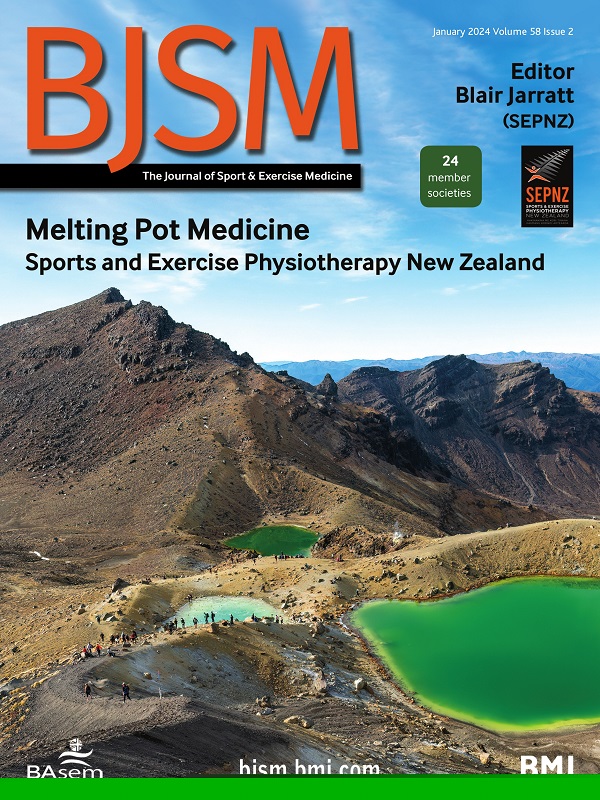Impact of postpartum physical activity on cardiometabolic health, breastfeeding, injury and infant growth and development: a systematic review and meta-analysis
IF 11.6
1区 医学
Q1 SPORT SCIENCES
引用次数: 0
Abstract
Objective To examine the relationship between postpartum physical activity and maternal postnatal cardiometabolic health, breastfeeding, injury, and infant growth and development. Design Systematic review with random-effects meta-analysis and meta-regression. Data sources Eight online databases were searched up until 12 January 2024. Eligibility criteria Studies of all designs in all languages were eligible (except case studies and reviews) if they contained information on the population (postpartum people), intervention (frequency, intensity, duration, volume, or type of exercise, alone (‘exercise-only’) or in combination with other intervention components (eg, dietary; ‘exercise+co-intervention’), comparator (no or low volumes of physical activity), and outcomes: hypertension, diabetes, cardiometabolic risk factors (systolic blood pressure (SBP), diastolic blood pressure (DBP), total cholesterol, high density lipoproteins, low density lipoproteins, and triglycerides, glycated hemoglobin (HbA1C), glucose and insulin concentration), breastfeeding (breast milk quality and volume), infant growth (length and weight) and development, or postpartum injury. Results 46 unique studies (n=8766 participants) from 20 countries were included. Moderate certainty of evidence showed exercise+co-interventions reduced the odds of developing diabetes by 28% (7 randomised controlled trials (RCTs), n=2496; OR 0.72 95% CI 0.54, 0.98, I2 12%), reduced SBP (10 RCTs, n=2753; mean difference (MD) −2.15 95% CI −3.89 to –0.40, I2 73%) and DBP (9 RCTs, n=2575; MD −1.38 95% CI −2.60 to –0.15, I2 66%) compared with controls. Infant growth and development, breast milk quality and quantity, and risk of injury were not different between exercise and control groups. Conclusions Physical activity improves cardiometabolic health without adversely impacting breast milk supply or quality, infant growth or maternal injury. Data are available upon reasonable request.产后体育锻炼对心脏代谢健康、母乳喂养、伤害和婴儿生长发育的影响:系统回顾和荟萃分析
目的 研究产后体力活动与产妇产后心脏代谢健康、母乳喂养、损伤以及婴儿生长发育之间的关系。设计 采用随机效应荟萃分析和荟萃回归进行系统回顾。数据来源 搜索了截至 2024 年 1 月 12 日的 8 个在线数据库。资格标准 所有语言、所有设计的研究(案例研究和综述除外),只要包含有关人群(产后人群)、干预措施(频率、强度、持续时间、运动量或运动类型,单独("纯运动")或与其他干预措施(如饮食;"运动+联合干预")相结合)、参照物(无运动量或运动量较小)和结果的信息,均符合资格:高血压、糖尿病、心脏代谢风险因素(收缩压 (SBP)、舒张压 (DBP)、总胆固醇、高密度脂蛋白、低密度脂蛋白和甘油三酯、糖化血红蛋白 (HbA1C)、葡萄糖和胰岛素浓度)、母乳喂养(母乳质量和量)、婴儿生长(身长和体重)和发育或产后损伤。结果 纳入了来自 20 个国家的 46 项研究(n=8766 名参与者)。中度确定性证据显示,运动+联合干预可将糖尿病发病几率降低 28%(7 项随机对照试验,n=2496;OR 0.72 95% CI 0.54, 0.98,I2 12%),与对照组相比,降低了 SBP(10 项随机对照试验,n=2753;平均差 (MD) -2.15 95% CI -3.89 至 -0.40,I2 73%)和 DBP(9 项随机对照试验,n=2575;MD -1.38 95% CI -2.60 至 -0.15,I2 66%)。运动组和对照组在婴儿生长发育、母乳质量和数量以及受伤风险方面没有差异。结论 体育锻炼可改善心脏代谢健康,但不会对母乳供应或质量、婴儿生长或产妇受伤产生不利影响。如有合理要求,可提供相关数据。
本文章由计算机程序翻译,如有差异,请以英文原文为准。
求助全文
约1分钟内获得全文
求助全文
来源期刊
CiteScore
27.10
自引率
4.90%
发文量
217
审稿时长
3-8 weeks
期刊介绍:
The British Journal of Sports Medicine (BJSM) is a dynamic platform that presents groundbreaking research, thought-provoking reviews, and meaningful discussions on sport and exercise medicine. Our focus encompasses various clinically-relevant aspects such as physiotherapy, physical therapy, and rehabilitation. With an aim to foster innovation, education, and knowledge translation, we strive to bridge the gap between research and practical implementation in the field. Our multi-media approach, including web, print, video, and audio resources, along with our active presence on social media, connects a global community of healthcare professionals dedicated to treating active individuals.

 求助内容:
求助内容: 应助结果提醒方式:
应助结果提醒方式:


